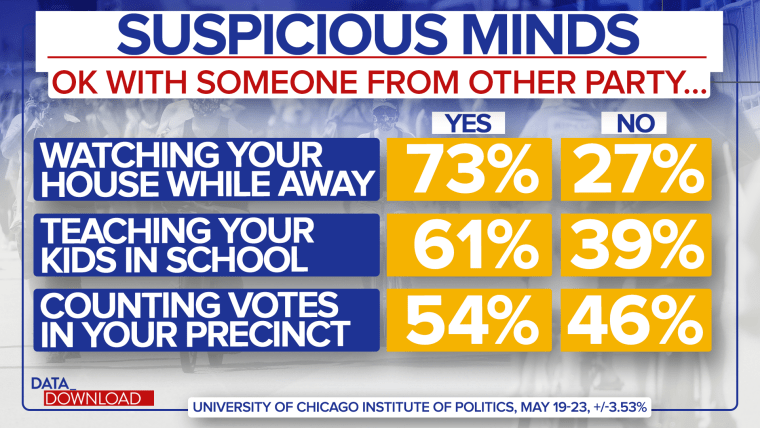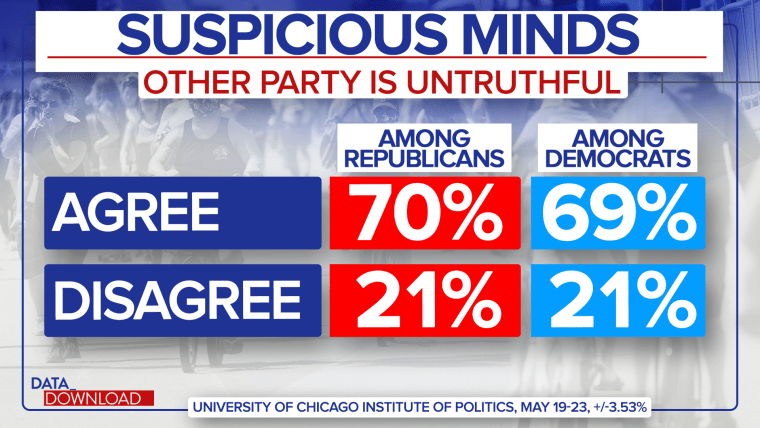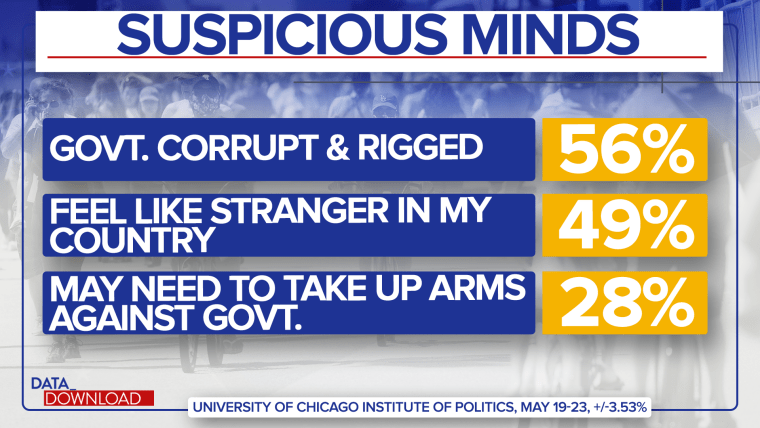WASHINGTON — The last years of American politics have been divisive and, at times, malicious, from the name-calling on social media to the January 6, 2021, uprising on the United States Capitol. And judging by a recent poll, all of these blows to the nation’s body politic have left a big bruise.
The University of Chicago Institute of Politics poll reveals a nation riven by extreme partisanship and alienation and full of citizens who look at each other and the system as a whole with doubt and distrust. You can see the impacts across the entire electorate using a wide range of metrics.
Let’s start with one of the most basic points, what to look for in a new acquaintance. The poll shows that a potential new friend’s political leanings are a more important factor than others, even some dynamics that have traditionally been viewed as divisive.
In the survey, 52% said someone’s “opinions about politics” were somewhat important or very important when it came to making new friends. This was the highest “significant” percentage of all the options offered in the survey.
‘Political opinions’ were ranked as more important than ‘music and entertainment tastes’ at 48% and higher than ‘religion’ at 30%. Political opinions were also higher than the figures for ‘education’ (33%) and ‘ethnicity’ (20%).
Beyond friendship, the poll also suggested that people’s party affiliation influences the trust respondents had in others to varying degrees on different issues.

Politics mattered less on some points. For example, it seems that someone’s political party isn’t a big factor when it comes to choosing someone to “watch your house when you’re away.” Almost three-quarters of those polled said they would be comfortable with someone from the opposite party doing this.
But the numbers dipped a little when the task was to ‘teach your children at school’ – 61% said they trusted someone from the opposing side with the task. And when the question turned to issues more directly related to democracy, the numbers fell even further. Only 54% said they would entrust someone from the other party with the task of “counting the votes in your constituency”.
The numbers also showed the challenges of trying to create political dialogue between Democrats and Republicans. Respondents said they enter most political conversations with someone from the other party expecting them to lie.

When Republicans were asked about Democrats and their honesty, 70% said they thought “Democrats generally lie and push misinformation.” It’s a pretty big lack of basic confidence.
But the other side has surprisingly similar views. When Democrats were asked about Republicans, 69% said “Republicans generally lie and push misinformation.”
All this partisan mistrust is taking its toll. After all, American politics is essentially a two-party system. If members of these parties don’t think they can be friends, aren’t sure they can trust those on the other side to count votes fairly, and think the other side is basically lying when their lips move , what does this mean for the greatest American experience?
The survey doesn’t offer many hopeful answers.

More than half of those polled, 56 percent, believe the government is “corrupt and rigged against ordinary people.” Almost half of the respondents, 49%, say they feel “more and more like foreigners” in their own country. And, perhaps more disturbingly, more than a quarter, 28%, said “it may be necessary at some point to take up arms against the government”.
To be fair, the poll’s crosstabs show that 28% are largely led by Republicans, especially “strong Republicans,” but remember it’s the Democrats who control the executive and legislative branches of government — from less for now. Support for this idea might look different if control in Washington breaks down.
And regardless of which group determines the number, there are plenty of reasons to be concerned about the data from this survey. It’s bad enough that “taking up arms against the government” has become a serious response among those who feel left behind politically. But it may be even more troubling that there doesn’t seem to be much way to change that view in these numbers. Lack of friends from opposing parties and interpartisan dialogue seem unlikely here.
Not only are the divides apparent, but finding a way to bridge the divides is not.

